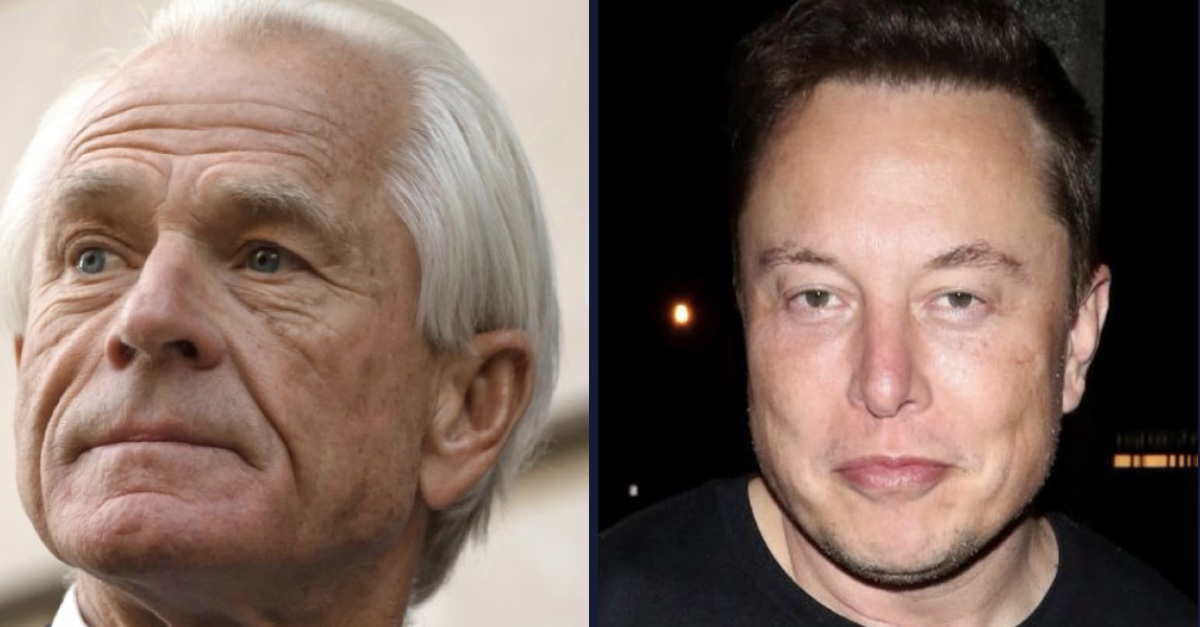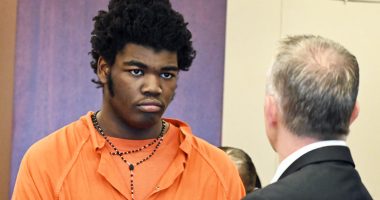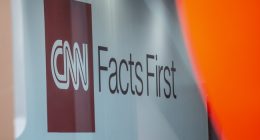
Peter Navarro (left) (via AP Photo/Mark Schiefelbein), (right) Elon Musk is seen on September 25, 2020 in Los Angeles, California (File Photo by: zz/Wil R/STAR MAX/IPx 2020 9/25/20).
The Supreme Court of the United States issued two high-profile case denials on Monday, as the justices refused to let former Trump trade adviser Peter Navarro out of prison as he appeals his contempt of Congress convictions and declined to take up Elon Musk’s First Amendment case against the SEC.
Navarro, incarcerated in FCI Miami and set to be released on July 17, Bureau of Prison records reviewed by Law&Crime show, had already tried once to convince Chief Justice John Roberts to let him out of prison pending appeal, but a renewed bid addressed to Justice Neil Gorsuch didn’t fare any better, as expected.
More Law&Crime coverage: ‘Precisely 0.0% chance of succeeding’: Peter Navarro resubmits appeal to stay out of prison to Gorsuch after already being rejected by Roberts
“The application for release pending appeal addressed to Justice Gorsuch and referred to the Court is denied,” the orders list denial said in brief.

Supreme Court rejects Peter Navarro’s plea from prison.
Navarro had argued through his attorney Stanley Woodward that “reconsideration” of his application was warranted, but the one-sentence second denial speaks for itself on that score.
Meanwhile, X owner Elon Musk’s lingering First Amendment case against the SEC has apparently come up empty in the eyes of the high court.

Supreme Court denies Elon Musk’s SEC case.
In December 2023, Musk attorneys William Burck and Alex Spiro, among others, asserted that the SEC engaged in “egregious agency overreach” in violation of the First Amendment by requiring that Musk — “[a]s a condition of settling a securities enforcement action” — to “obtain explicit ‘pre-approval’ before engaging in ‘written communication’ on a wide range of subjects,” even though those subjects went “far beyond the charged violations.”
“This case arises from one aspect of the SEC’s ongoing campaign against Mr. Musk and his companies. As part of a consent decree to settle allegations of securities fraud (allegations that a federal jury in a separate case later found did not constitute securities fraud), the SEC demanded that Mr. Musk refrain indefinitely from making any public statements on a wide range of topics unless he first received approval from a securities lawyer. Only months later, the SEC sought to hold Mr. Musk in contempt of court on the basis that Mr. Musk allegedly had not obtained such approval for a post on Twitter (now X),” the petition explained. “In effect, the SEC sought contempt sanctions—up to and including imprisonment—for Mr. Musk’s exercise of his First Amendment rights.”
More Law&Crime coverage: ‘None of his arguments hold water’: Elon Musk loses claim that his consent decree with the SEC violates his First Amendment rights
While the lower courts determined that Musk’s arguments could not succeed for the simple reason that he “accepted the settlement agreement,” the “pre-approval provision at issue continues to cast an unconstitutional chill over Mr. Musk’s speech whenever he considers making public communications,” as Musk’s petition put the issue.
Nonetheless, the justices have declined to hear the case.
Have a tip we should know? [email protected]








